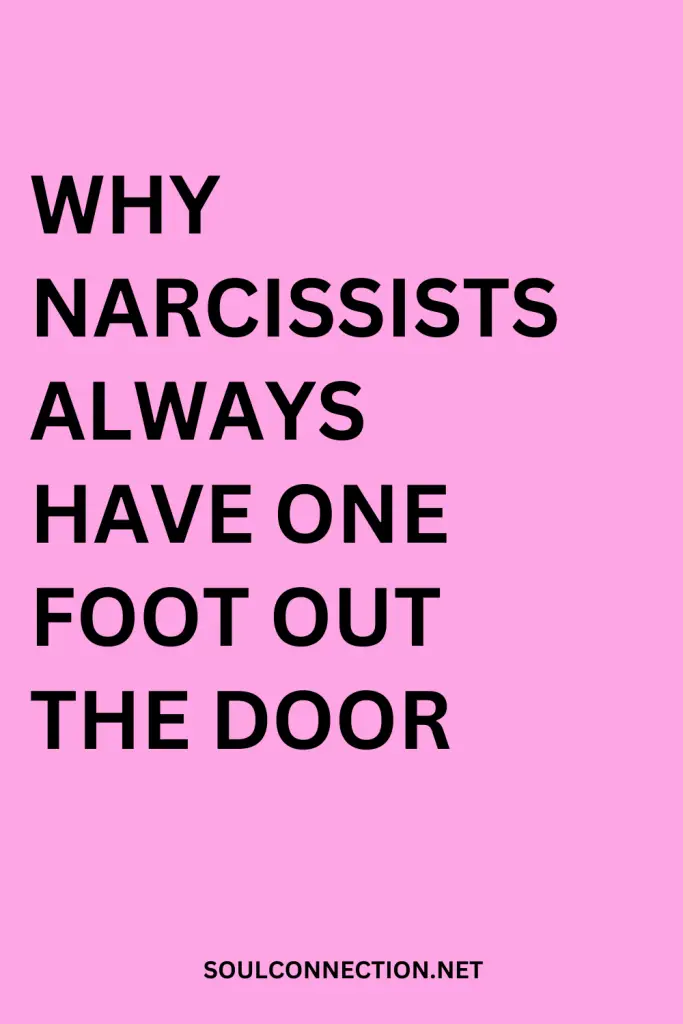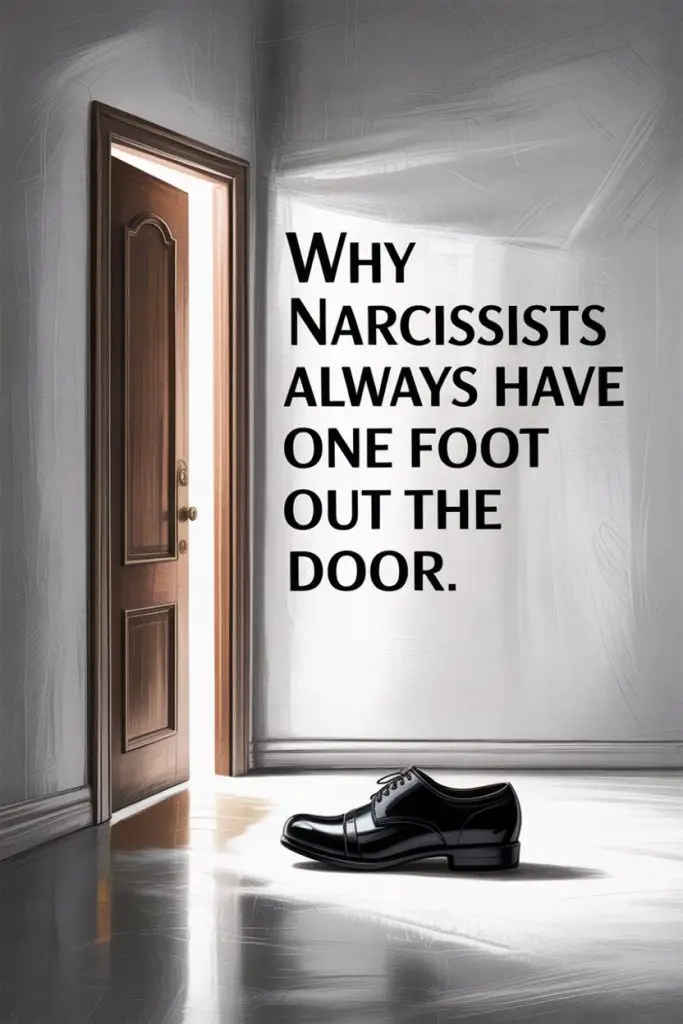Narcissists are famous for keeping one eye on you—and the other scanning for the nearest exit. Even when they’re all in, they’re never really all in, are they?
If you’ve ever found yourself loving someone who always seems ready to bolt (phone face-down, suitcase never fully unpacked, emotionally on tiptoe), you’ve probably wondered: Why do narcissists act like relationship escape artists?
Pull up a seat—let’s unpack the heart of the matter and see what makes narcissists so relentlessly slippery in love.
The Thrill of the Chase and the Dread of the Mundane
Narcissists adore a fresh romance—as long as it’s thrilling, unpredictable, and they’re the star of the show. That giddy, electric phase at the start? Pure catnip.
They’ll love-bomb, charm, and dazzle with all the intensity of a contestant on The Bachelor.
Once the relationship settles into something resembling real life (Netflix, laundry, conversations about bills), the magic dims. Suddenly, the narcissist’s eyes glaze over. Routine spells death by boredom.
And guess who gets the blame for the missing spark? Yep, you.
For narcissists, emotional intimacy is like broccoli—good for you, but deeply unappealing.
The thrill-seeking urge whispers, “Don’t settle down! There’s something better just around the corner!” No wonder their bags are always mentally half-packed.
Commitment Feels Like a Trap
For most people, commitment is a steady, safe place. For a narcissist, it feels like the walls closing in. Promises, exclusivity, and emotional availability? These things send their anxiety meters into the red zone.
Deep down, narcissists dread losing their freedom (or at least the illusion of it). If things get too cozy, they start looking for the nearest exit—just in case.
They might not leave right away, but you’ll feel the distance: a little less texting, a vague new “friend” they swear is nothing, lots of solo plans “to clear their head.” Their motto? Never let anyone get close enough to see what’s really going on inside.
Never-Ending Search for Validation
Narcissists are addicted to validation like toddlers are to sweets. The more, the better—preferably from multiple sources. If you’re not serving up a constant stream of praise, admiration, or ego strokes, they’ll seek it elsewhere.
This doesn’t always mean cheating, but it does mean they keep their social options open.
They’ll flirt with strangers, keep exes on standby, or cultivate a fan club online. If admiration runs dry in your relationship, the narcissist’s attention will drift—fast. And when you catch on, they’ll insist you’re “too insecure.” Cheeky, right?
Emotional Safety Is a Foreign Concept
Vulnerability is kryptonite to a narcissist. Sharing genuine emotions (other than rage or grandiosity) feels like standing naked in a snowstorm. Since they can’t tolerate feeling weak or exposed, they keep a protective shield up at all times.
That shield? One foot out the door. If things get too emotionally intense—say, you ask for more honesty, or talk about your own needs—they’ll retreat behind jokes, deflection, or even ghosting.
The exit strategy is always in play, especially when real closeness threatens their armor.
Backup Plans: The Secret Comfort Blanket
It doesn’t matter how wonderful you are. Narcissists almost always have a backup plan: a “just-in-case” ex, a dating app profile, a flirtatious work buddy.
This isn’t always about cheating; sometimes, it’s just about knowing they have options.
The backup plan soothes the narcissist’s biggest fear: being alone or unadmired. It’s not personal—at least, not to them. Still, you’ll sense the lingering whiff of “Plan B” every time they act distant or distracted. (Spoiler: You’re not imagining it.)
Idealization and Devaluation: The Relationship Rollercoaster
Narcissistic relationships swing between idealization (you’re perfect, you’re everything, you’re the answer to their wildest dreams) and devaluation (suddenly, you’re flawed, boring, or not trying hard enough). This constant lurching keeps you on edge—and them entertained.
When the idealization phase wears off, narcissists often get itchy feet. They’ll withdraw affection, start fights, or claim you’ve changed. In reality, it’s their attention span that’s run out, not your charm.
The fear of commitment kicks in, and the cycle repeats. Cue the one-foot-out-the-door routine.
Fear of Being Exposed
Deep down, narcissists carry a gnawing sense that they’re not as fabulous as they pretend to be. They dread being “found out” as ordinary, vulnerable, or flawed.
The closer you get, the more dangerous you become—you might see through the mask.
Having an escape hatch ready keeps them safe from humiliation or rejection. If you start noticing cracks in the facade, they’ll back away, sabotage the relationship, or bolt for someone new who doesn’t know their secrets.
That suitcase by the door? It’s not just metaphorical.
How to Cope When Your Partner’s Always Halfway Out
It’s exhausting loving someone who treats commitment like a contagious disease. If this all rings a little too true, here’s how to save your sanity:
Check your own expectations. You can’t outlove, out-give, or out-patience a narcissist into staying. Their itchy feet aren’t your fault, and your worth doesn’t hinge on their approval.
Set stronger boundaries. Make it clear what you won’t tolerate—emotional games, constant flirting, or drifting in and out. Boundaries aren’t ultimatums; they’re self-respect in action.
Call out the pattern (gently). If you notice your partner pulling away, say something. “I feel like you’re emotionally checked out lately. Is there something going on?” If they deflect or rage, that’s data—not a reason to take the blame.
Don’t chase. Begging a narcissist for commitment is like asking a cat to explain quantum physics: pointless and slightly humiliating. Invest that energy in yourself, your friends, and the parts of your life that make you shine.
Recognize when it’s time to walk. If you’re forever tiptoeing around their moods, second-guessing yourself, or feeling like a placeholder, it might be time to take your own foot out the door (with both shoes, dignity intact).
When They Finally Leave—And Why That’s Not the End
Narcissists may eventually bail—sometimes dramatically, sometimes by just fading away. You might feel devastated, angry, relieved, or all three (throw in a pint of ice cream and you’ve got the trifecta).
Here’s the kicker: many narcissists circle back later, sniffing around to see if you’ll take them back.
Maybe things didn’t work out with their backup plan. Maybe you’re glowing in their absence. Maybe they just need an ego snack.
If you do give them another shot, expect the same pattern: intense pursuit, rapid cooling, mysterious distance. Spotting the cycle is half the battle.
Narcissists and Commitment: Oil and Water
Narcissists don’t actually hate relationships. They just hate feeling tied down, vulnerable, or ordinary.
The grass always looks greener elsewhere, and unless they do some serious self-work (therapy, anyone?), that one-foot-out-the-door reflex never fully goes away.
If you’re hooked on a narcissist, it’s tempting to believe you’ll be the exception. You might be told you’re dramatic, needy, or “not chill enough.”
The truth is, you’re asking for basic respect and commitment. Not exactly high-maintenance.
Breaking the Pattern—Tonight
Wondering how to put this wisdom into practice? Take a beat tonight. Check in with how you’re feeling—resentful, anxious, constantly on edge? That’s not love talking; that’s survival mode.
Your needs matter, and you deserve a partner who shows up with both feet, heart, and suitcase firmly in your world.
If you can’t get that with your current partner, don’t blame yourself. Narcissists are masterful at keeping people off-balance.
But once you spot the pattern, you can get off the merry-go-round, dust yourself off, and start looking for someone who’s ready to stay.
Here’s to loving with both feet in—and never again feeling like someone’s emergency exit.


